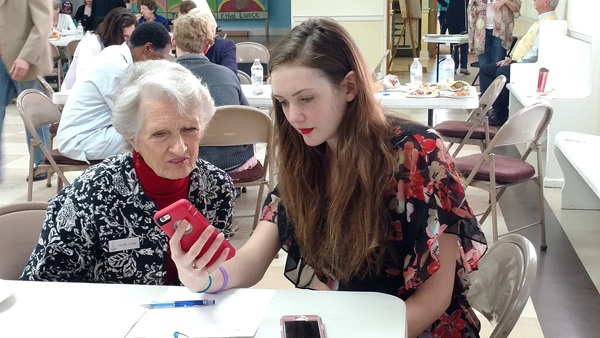Technology can be a wedge dividing older-generation United Methodists from younger ones as the pace of technological innovation steadily increases and makes the smartphone purchased last month obsolete. However, the youth ministry at Asbury Memorial United Methodist Church in Savannah, Georgia, is leveraging technological change to unite rather than divide the generations.
Inspired by a New York Times article on reverse mentoring, Mary Ellen Campbell, vice-chairperson of the Asbury church council and a member of the youth leadership team, broached the idea to the youth of hosting a reverse mentoring opportunity. The youth would assist their elders in the church with their technological needs by working through problems and questions about their smartphones, laptops and tablets.
Like all good youth volunteers, Campbell went the extra mile to facilitate as the students designed and led the program rather than planning it herself. In planning, the youth tackled questions such as when to have the event to draw the largest crowd, how to announce it and how to get it on the church calendar.
Once the big pieces were in place, Campbell had the students think through the kinds of qualities and skills they needed to exhibit in order to teach a skill to a senior. She said, "They identified patience, speaking clearly and slowly, making sure they are (speaking) loud enough, giving the device to the senior for them to apply what they were learning and repeating the skill."
When it came time to promote the event to the church, the young people's creativity shone. "We did a skit during church announcements with the minister not knowing how to turn on his cell phone and the youth coming out to save the day."
Along the way, the youth discovered that the event was more than an opportunity to help seniors install apps or remove malware. Jackson Brantley, a senior at Savannah Arts Academy, said, "Basically it provides a foundation for the youth to build relationships beyond the normal or surface, ‘Hey how's it going?' It was a peer-to-peer experience because we were working on a problem together."
The feeling was mutual. Carol Klein, an Asbury Memorial member for more than 14 years, was one of many older adults who wrote an email to the Rev. Billy Hester, pastor, saying, "It was such a pleasure to see the wonderful kids we have in our youth group. They were so polite, bright and gracious. I learned so many things I did not know about my iPhone and my Mac."
To other churches considering doing something along these lines, Campbell advises, "Go for it, be smart and shamelessly steal anything that we have already created to assist in the planning, but allow lots of time to allow the youth to be intimately involved in idea generation and planning for the event."
There is no need for technology to divide individuals, churches or generations. With a little creativity, the technology divide can be transformed into an opportunity for intergenerational community!
The Rev. Jeremy Steele is Next Generation minister at Christ United Methodist Church, Mobile, Alabama. He is also an author, blogger at jeremywords.com and a frequent contributor to MyCom, an e-newsletter published by United Methodist Communications.
Originally published in Interpreter Magazine, May –June , 2017.

